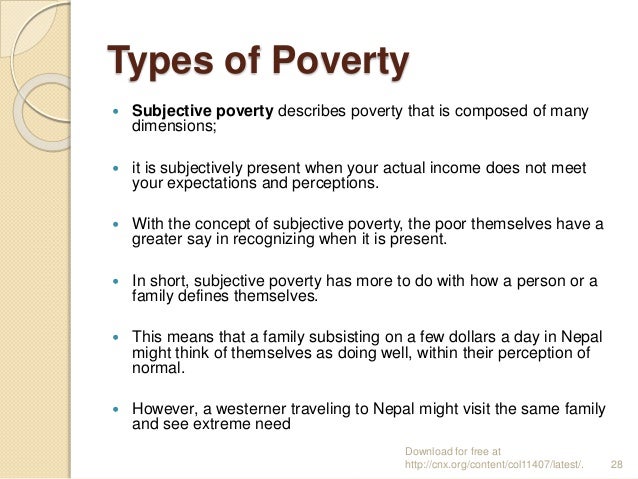Imagine a bustling city street, where gleaming skyscrapers stand tall, a stark contrast to the homeless individual huddled on a sidewalk, their belongings tucked into a worn-out shopping cart. While we might readily recognize this individual’s material deprivation, what about the countless others struggling silently, their needs unmet, their aspirations dimmed? This is where the concept of subjective poverty, a crucial aspect of sociology, offers a deeper understanding of societal inequalities and the human cost of deprivation.

Image: www.slideshare.net
Subjective poverty goes beyond mere income or material possessions. It delves into the individual’s personal perception of their well-being, their sense of belonging, and their ability to participate fully in society. It is about feeling deprived, not just by a lack of resources, but by a sense of inadequacy, helplessness, and exclusion. This article explores the multifaceted nature of subjective poverty, its implications for individuals, communities, and society as a whole, and how it shapes our understanding of poverty and its impact on human lives.
Unmasking the Subjective Experience
Subjective poverty, also known as perceived poverty, is not defined by objective criteria like a fixed poverty line. Instead, it is a personal and dynamic experience shaped by individual circumstances, cultural norms, and societal expectations. A person may be objectively considered “above the poverty line” based on income, yet still feel deprived if their needs are not met, or they lack access to basic services like healthcare or education.
Subjective Poverty: A Social Construct
The concept of subjective poverty highlights the role of social constructs in shaping our perceptions of well-being. For example, a person may feel impoverished if they lack a car in a society where car ownership is considered a necessity for social mobility, even if they can afford public transportation. The “feeling poor” isn’t just about income but also about a perceived lack of resources and opportunities compared to others in their social circle or society.
The Multifaceted Nature of Subjective Poverty
Subjective poverty is not a monolithic concept. It manifests in various dimensions, influencing a person’s social, cultural, and psychological well-being. These dimensions include:
- Social Inclusion: Feeling isolated, excluded, or marginalized from social activities, community engagement, or decision-making processes.
- Cultural Participation: Lacking access to cultural experiences, leisure activities, or social networks that are considered essential for a fulfilling life.
- Health and Well-being: Suffering from physical or mental health issues, limited access to healthcare, or experiencing stress and anxiety due to financial insecurity.
- Education and Skills: Feeling lacking in education or skills necessary for employment, personal growth, or societal participation.

Image: devinitionva.blogspot.com
Measuring Subjective Poverty
While subjective poverty is inherently personal, sociologists have developed methods to measure and understand it. This includes:
- Surveys and Questionnaires: Asking individuals about their perceived level of deprivation, their satisfaction with their living standards, and their ability to meet their basic needs.
- Qualitative Research: Conducting interviews and focus groups to gather rich narratives and insights into people’s subjective experiences of poverty.
- Social Indicators: Analyzing social indicators such as crime rates, educational attainment, and health outcomes to assess the overall well-being of a community.
The Impact of Subjective Poverty
Subjective poverty has profound implications for both individuals and society. It can lead to:
- Reduced Life Satisfaction and Well-being: Individuals who feel deprived may experience lower levels of happiness, life satisfaction, and well-being. Their overall quality of life can be negatively impacted, leading to feelings of despair, hopelessness, and low self-esteem.
- Social Exclusion and Marginalization: Subjective poverty can lead to social exclusion, where individuals feel alienated, isolated, and disconnected from society. This isolation can exacerbate vulnerabilities and limit opportunities for social mobility.
- Increased Strain on Social Systems: Subjective poverty puts a strain on social systems like healthcare, education, and criminal justice, as individuals may require more support due to mental health challenges or increased vulnerability to crime.
Breaking the Cycle: Empowering Individuals and Communities
Addressing subjective poverty requires a multifaceted approach that considers the social, cultural, and psychological dimensions of deprivation. Strategies include:
- Building Social Connections and Networks: Increasing community participation, fostering intergenerational connections, and promoting social inclusion can empower individuals and build a sense of belonging.
- Providing Access to Education and Skills Development: Educating individuals about their rights, providing opportunities for skills development, and fostering a sense of agency can help them overcome feelings of inadequacy and gain control over their lives.
- Empowering Individuals through Financial Literacy: Teaching financial literacy skills can help individuals manage their finances effectively, make informed decisions, and reduce financial stress.
- Creating Inclusive Social Policies: Implementing policies that address social inequalities, promote equitable access to resources, and foster a sense of fairness can help reduce the risk of subjective poverty.
Subjective Poverty Definition Sociology
Subjective Poverty: A Call to Action
Subjective poverty is a powerful reminder that our understanding of poverty cannot solely rely on objective measures. It is about acknowledging the human experience, recognizing individual vulnerabilities, and fostering a society that thrives on inclusion, empowerment, and a sense of shared well-being. By understanding subjective poverty, we can move beyond the mere reduction of financial deprivation to create a world where everyone has the opportunity to thrive, contributing their unique talents to creating a more just and equitable society.






